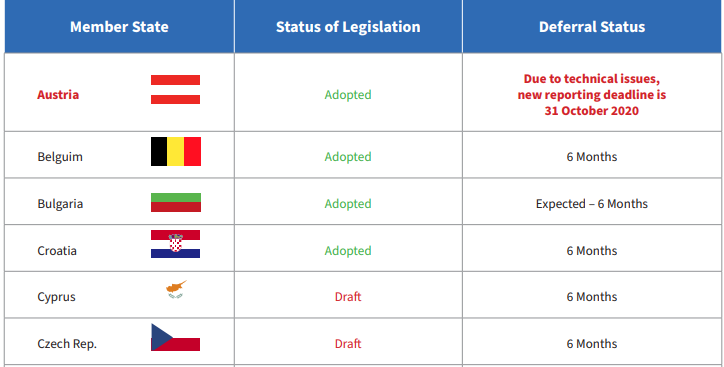The UK’s alert level for COVID-19 was recently downgraded from level 4 to 3 and, in light of this, we’ve seen many businesses cautiously reopen and embrace a new kind of normal. Still, the easing of lockdown means the pressure is on for organisations to remain ultra-vigilant and to implement all measures possible to protect their customers and employees from risk.
Understanding health and safety best practice is more important now than ever before, and whether your organisation is already open, or plans to implement new working from home measures long-term, there are regulations employers cannot afford to neglect.
To help ease the transition, we’ve spent some time uncovering the 8 laws your organisation is most likely to unwittingly break. With employee wellbeing in the balance (not to mention companies can face heavy fines if found guilty of non-compliance at an employment tribunal), it’s important your business doesn’t drop the regulatory ball.
Here are 8 laws you could be breaking right now:
- You don’t consider your employee’s request for flexible working
It’s likely many organisations will consider more flexible working policies following the coronavirus outbreak. Senior management teams around the country have been pleasantly surprised by levels of productivity from remote workforces, and, likewise, many employees have enjoyed having no commute and a better work/life balance. Equally, returning to the office ‘as usual’ could result in high levels of anxiety amongst employees, with a recent survey confirming that many of us have concerns about returning to work. With this in mind, employers should remember the Flexible Working Regulations 2014 which state that an employee who has been “continuously employed for a period of at least 26 weeks is entitled to make a flexible working application”. In fact, employers can only refuse a request for one of eight reasons, and this reason must be given in writing alongside details of your company’s appeals procedure.
Possible fine for non-compliance: You could be required to pay your employee up to 8 weeks’ pay. A week’s pay is currently capped at £538 and is increased on 6 April every year.
2. You aren’t considering the health and safety of remote workers
Employers with teams of more than 5 people have obligations under The Health and Safety at Work Act 1974, The Display Screen Equipment Regulations, and The Provision and Use of Work Equipment Regulations to safeguard the health, safety, and wellbeing of their workforce – even if that workforce is working from remotely. This means risk assessments must be completed (they can be self-assessments) for all employees working from home to highlight and mitigate any areas of high risk. It is the employers’ responsibility to implement any changes necessary that are uncovered by the risk assessment.
Given the current circumstances, and in their eagerness to move the workforce to the safety of their own homes, it’s possible that employers may have overlooked their responsibility for home workers’ health and safety here. Don’t forget, furloughed staff are still employees with employment rights and, as such, are owed the same duty of care as members of staff still able to work.
Possible fine for non-compliance: The Parker Hannifin Manufacturing Ltd case demonstrates that organisations can be heavily fined for breaching regulations. This firm was fined £1 million for breaching regulation 3(1) of the Management of Health and Safety at Work regulations and Section 2(1) of the Health and Safety at work Act 1974.
3. You fail to provide staff with the right equipment
Following on from above, it’s the responsibility of employers to ensure employees have completed a display screen equipment assessment (although this can be undertaken as a self-assessment with appropriate guidance). However, there’s also a non-delegatory duty to fund costs under The Health and Safety (Display Screen Equipment) Regulations which applies to workers who use DSE daily and continually for more than an hour at a time for the provision of eye tests and of special corrective equipment.
For example, you may have come across organisations that provide employees a budget with which to purchase equipment and appliances they need to work safely, e.g. a supportive chair, footrest, or wrist support. It’s worth remembering that this equipment remains the property of the company for return upon request.
Possible fine for non-compliance: Recent legislation removed the fine cap (previously £5,000 – £20,000) and allowed magistrates courts to give out unlimited fines for offences committed on or after the 12th of March 2015.
4. You neglect to consider your employees mental health
According to the Health and Safety at Work Act 1974, companies must assess and mitigate the risk of work-related stress amongst employees. Given recent circumstances, these levels are potentially higher than normal (employees working from home are reporting higher workloads and longer work hours in some circumstances, as well as the additional stress of caring for children and other dependents during lockdown). Keeping open communication between managers and team members, scheduling in regular breaks throughout the day, and offering regular company updates to keep employees informed about the business, are all things you can do to help manage stress levels at work.
Possible fine for non-compliance: Employees can be awarded compensation Working Times Regulations breaches, where they suffer serious mental or physical consequences as a result of the circumstances imposed by their employer.
5. You haven’t provided new employees with written particulars of employment
It has been encouraging to see many organisations continue to hire new staff during lockdown (ourselves included!) with interviews being carried out virtually using video conferencing software. Remember, though, virtual employment offers do not excuse the need for written particulars of employment. In fact, under the Employment Rights Act 1996, all new members of staff must be served in writing with information about holiday rights, sick pay entitlements, and information about notice agreements within two months of joining. Additionally, any changes to this contract must also be served in writing or companies could face a breach of contract claim.
Possible fine for non-compliance: Failure to have written particulars: 2-4 weeks pay. Currently a week’s pay is capped at £538 but is increased on 6 April every year.
Failure to consult on changes to a contract could result in a fine per employe of up to 90 days gross pay (if this involves 20 or more employees) or could result in a breach of contract claim or constructive unfair dismissal claim in which the compensatory award is currently capped at 52 weeks gross pay or £88,519 whichever is less.
6. You haven’t given employees information on the company’s health and safety policies
The Health and Safety at Work Act 1974 states that business leaders must “prepare and, as often as may be appropriate, revise a written statement of his general policy in respect to the health and safety at work of his employees and the organisation and arrangements for the time being in force for carrying out that policy, and to bring the statement and any revision of it to the notice of all his employees.” This directive is also covered under the The Management of Health and Safety at Work Regulations 1999. Worryingly, according to a survey by data capture app provider, WorkMobile, as many as 65% of staff have not received any information about their company’s health and safety policies. Yikes!
Possible fine for non-compliance: The maximum penalty for failure by an employer to comply with a general duty imposed by HSWA 1974, ss 2–7 on summary conviction is six months imprisonment or an unlimited fine or both. On indictment, the maximum penalty is two years imprisonment or a fine or both.
7. You aren’t reporting workplace injuries
There are certain workplace injuries, diseases, and near-misses that must be reported to the Health and Safety Executive (HSE) in the UK. This directive is covered under the Reporting of Injuries, Diseases and Dangerous Occurrences Regulations 2013, also known as RIDDOR. Additionally, organisations employing more than 10 members of staff are required by law to keep an accident book and store it safely for 3 years.
Possible fine for non-compliance: Failure to report ‘reportable’ accidents is a criminal offence and the responsible person can be sentenced in the Magistrates’ Court with a fine up to £20,000, or in the Crown Court with an unlimited fine. Individuals deemed responsible for non-reporting can also face a period of imprisonment for up to two years.
8. You aren’t protecting staff from the risks of workplace diseases
Does your workplace have air-con, hot and cold water systems, or on-site showers? If so, you need to be aware of hidden dangers like Legionnaires’ disease, an uncommon yet potentially fatal form of pneumonia. Legionnaires’ disease can spread to humans when we inhale small water droplets containing the bacteria. Given the amount of time many of us spend in the office, it’s important to inspect, maintain, and regularly service all water management systems your employees use (think water tanks, thermostatic mixing valves and water treatment equipment).
Possible fine for non-compliance: G4S Cash Solutions has been fined £1.8 million after failing to reduce the risk of Legionnaires’ disease from its water systems
Final Word
I think we can all agree that 2020 has been a tough year so far, and we want to reiterate that the information above is not meant to scaremonger or cause further alarm. Rather, it’s a reminder about the legislative responsibilities all business owners have to protect their biggest asset – their staff.
With special thanks to Richard Nelson LLP for their expert advice on this topic.















